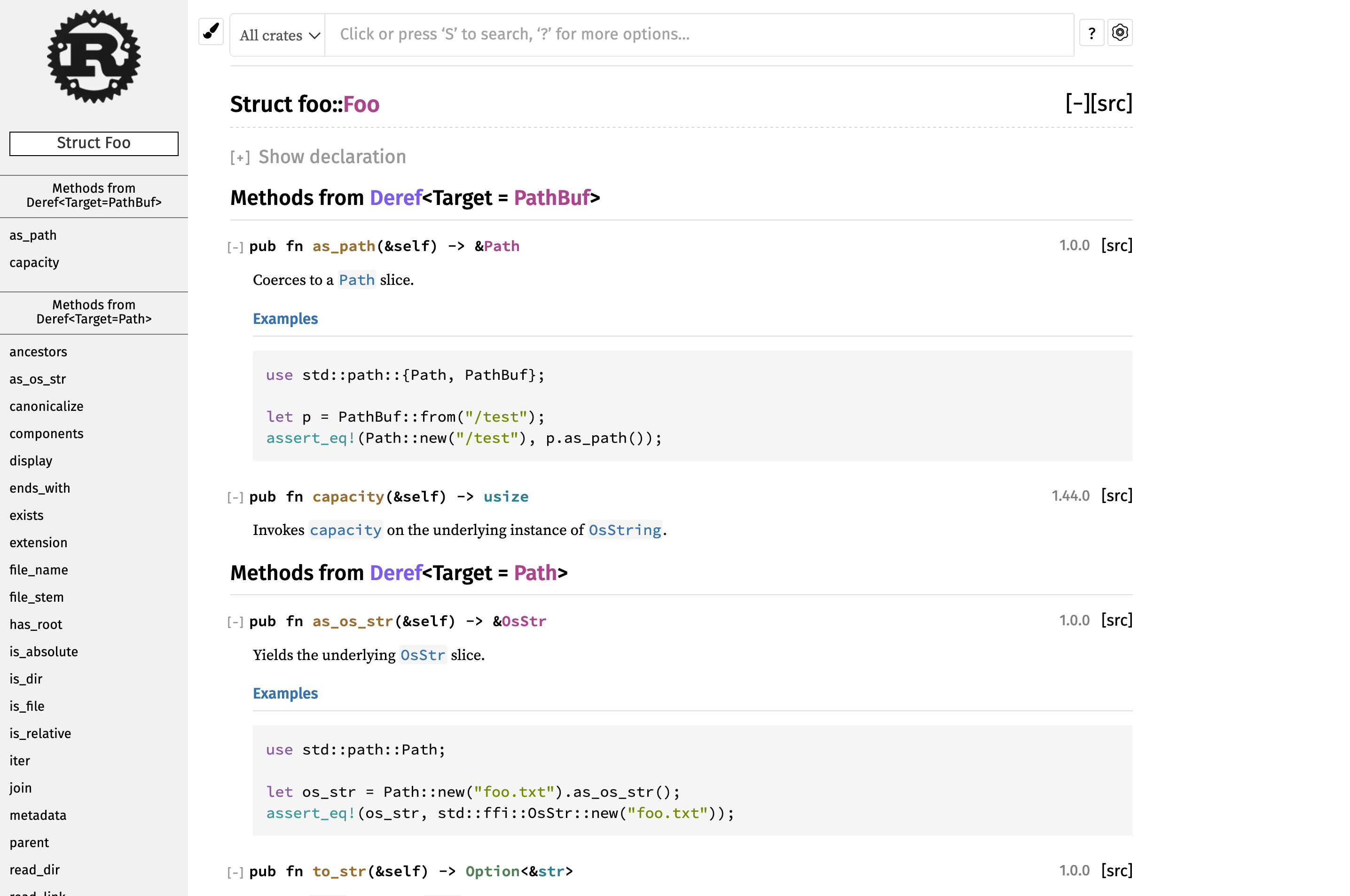It was previously defined in `render::search_index` but wasn't used at
all there. `clean::types` seems like a better fit since that's where
`ExternalCrate` is defined.
Don't emit shared files when scraping examples from dependencies in Rustdoc
This PR fixes#91605. The issue is that `Context::init` gets called when scraping dependencies. By default, just calling `init` calls into `write_shared` and `build_index` which register the scraped crate into a list that later gets used for the Rustdoc sidebar. The fix is to ensure that `write_shared` is not called when scraping.
r? `@jyn514`
`render/context` always runs after `run_global_context`, so it was always set to `true`.
This is a holdover from when rustdoc allowed configuring passes, but the `collapse-docs` pass was
removed ages ago, and the ability to configure passes is about to be removed.
By changing `as_str()` to take `&self` instead of `self`, we can just
return `&str`. We're still lying about lifetimes, but it's a smaller lie
than before, where `SymbolStr` contained a (fake) `&'static str`!
We carry around a list of stylesheets that can carry two different types
of thing:
1. Internal stylesheets specific to a page type (only for settings)
2. Themes
In this change I move the link generation for settings.css into
settings(), so Context.style_files is reserved just for themes.
We had two places where we extracted a base theme name from a list of
StylePaths. I consolidated that code to be a method on StylePath.
I moved generation of link tags for stylesheets into the page.html
template. With that change, I made the template responsible for special
handling of light.css (making it the default theme) and of the other
themes (marking them disabled). That allowed getting rid of the
`disabled` field on StylePath.
rustdoc: Compute some fields of `clean::Crate` on-demand to reduce size
`clean::Crate` is frequently moved by-value -- for example, in `DocFolder`
implementations -- so reducing its size should improve performance.
This PR reduces the size of `clean::Crate` from 168 bytes to 104 bytes.
r? `@jyn514`
Show all Deref implementations recursively
Fixes#87783.
This is a re-implementation of #80653, so taking the original PR comment:
This changes `rustdoc` to recursively follow `Deref` targets so that methods from all levels are added to the rendered output. This implementation displays the methods from all levels in the expanded state with separate sections for each level.

cc `@camelid`
r? `@jyn514`
It is only used in one place; `src` was about a third of `Crate`'s total
size; `Crate` is frequently moved by-value; and `src` can be easily
computed on-demand.
* Move call location logic from function constructor to rendering
* Fix issue with macro spans in scraping examples
* Clean up example loading logic
Documentation / newtype for DecorationInfo
Fix line number display
Serialize edition of call site, other small cleanup
Move rendering of examples into
Finalize design
Cleanup, rename found -> scraped
Softer yellow
Clean up dead code
Document scrape_examples
More simplification and documentation
Remove extra css
Test
Commit 95e096d6 changed a bunch of size checks already, but more have
been added, so this fixes the new ones the same way: the various size
checks that are conditional on target_arch = "x86_64" were not intended
to apply to x86_64-unknown-linux-gnux32, so add
target_pointer_width = "64" to the conditions.
Replaces a format!() call in layout::render with a template
expansion. Introduces a `templates` field in SharedContext so parts
of rustdoc can share pre-rendered templates.
This currently builds in a copy of the single template available, like
with static files. However, future work can make this live-loadable with
a perma-unstable flag, to make rustdoc developers' work easier.
Update documentation for SharedContext::maybe_collapsed_doc_value
Fixes#85120.
The `doc-collapse` was removed, however, the main crate is always "collapsed", meaning that this function is still needed. I updated the documentation instead to avoid misleading readers.
r? `@jsha`
Fix `--remap-path-prefix` not correctly remapping `rust-src` component paths and unify handling of path mapping with virtualized paths
This PR fixes#73167 ("Binaries end up containing path to the rust-src component despite `--remap-path-prefix`") by preventing real local filesystem paths from reaching compilation output if the path is supposed to be remapped.
`RealFileName::Named` introduced in #72767 is now renamed as `LocalPath`, because this variant wraps a (most likely) valid local filesystem path.
`RealFileName::Devirtualized` is renamed as `Remapped` to be used for remapped path from a real path via `--remap-path-prefix` argument, as well as real path inferred from a virtualized (during compiler bootstrapping) `/rustc/...` path. The `local_path` field is now an `Option<PathBuf>`, as it will be set to `None` before serialisation, so it never reaches any build output. Attempting to serialise a non-`None` `local_path` will cause an assertion faliure.
When a path is remapped, a `RealFileName::Remapped` variant is created. The original path is preserved in `local_path` field and the remapped path is saved in `virtual_name` field. Previously, the `local_path` is directly modified which goes against its purpose of "suitable for reading from the file system on the local host".
`rustc_span::SourceFile`'s fields `unmapped_path` (introduced by #44940) and `name_was_remapped` (introduced by #41508 when `--remap-path-prefix` feature originally added) are removed, as these two pieces of information can be inferred from the `name` field: if it's anything other than a `FileName::Real(_)`, or if it is a `FileName::Real(RealFileName::LocalPath(_))`, then clearly `name_was_remapped` would've been false and `unmapped_path` would've been `None`. If it is a `FileName::Real(RealFileName::Remapped{local_path, virtual_name})`, then `name_was_remapped` would've been true and `unmapped_path` would've been `Some(local_path)`.
cc `@eddyb` who implemented `/rustc/...` path devirtualisation
Unify rustc and rustdoc parsing of `cfg()`
This extracts a new `parse_cfg` function that's used between both.
- Treat `#[doc(cfg(x), cfg(y))]` the same as `#[doc(cfg(x)]
#[doc(cfg(y))]`. Previously it would be completely ignored.
- Treat `#[doc(inline, cfg(x))]` the same as `#[doc(inline)]
#[doc(cfg(x))]`. Previously, the cfg would be ignored.
- Pass the cfg predicate through to rustc_expand to be validated
Technically this is a breaking change, but doc_cfg is still nightly so I don't think it matters.
Fixes https://github.com/rust-lang/rust/issues/84437.
r? `````````@petrochenkov`````````